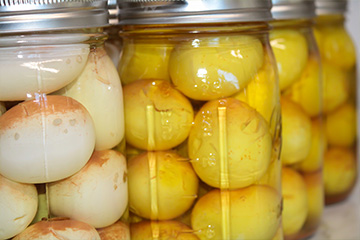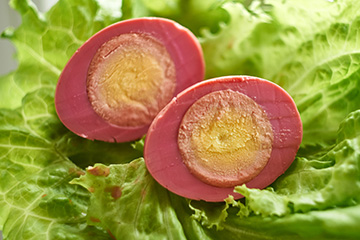
Do NOT Can Pickled Eggs

While you may see home-canned pickled eggs for purchase, it is actually not safe to can pickled eggs at home. In fact, home-pickled eggs stored at room temperature were linked to a case of botulism — so just imagine long term shelf storage of canned pickled eggs! If you enjoy the taste of pickled eggs, you can pickle eggs at home by following good sanitation and food safety practices during the process, and if you always store the eggs in the refrigerator!
How to pickle eggs
Remember there are no research supported home canning processes for pickled eggs. The recipes provided here are all meant to be stored in the refrigerator. Pickled eggs should never be stored at room temperature, except during serving and they should not be at room temperature for more than two hours.
Eggs: Each of the recipes listed in this newsletter uses 12 eggs. Small to medium size eggs work best for pickling as they more easily take on the flavoring of the pickling brine. Use the freshest eggs available. All eggs need to be hard-boiled and shells removed.
Jars: Glass canning jars work well for pickling. A quart size jar will hold approximately one dozen medium eggs. Jars and lids should be sterilized before use. To sterilize the jars and lids, place in boiling water for 10 minutes. Keep the jars and lids warm in the water while you prepare the pickling solution.
Pickling solution: All of the pickling solutions provided here require bringing all the ingredients (except the eggs) to a boil, reduce the heat and simmer for five minutes.
Packing the jars: Pack no more than one dozen peeled, hard-cooked eggs loosely into a warm, pre-sterilized quart jar. Completely cover the eggs with the hot pickling solution, place the lid on the jar, and refrigerate immediately. Allow eggs to cure for 1 to 2 weeks for best flavor. Eggs should be eaten within 3 to 4 months.
Red Beet Eggs

- 1 cup red beet juice (from canned beets)
- 1½ cups cider vinegar
- 1 teaspoon brown sugar
- a few canned whole tiny red beets (or several slices of beets can be used)
Dilled Eggs
- 1½ cups white vinegar
- 1 cup water
- ¾ teaspoon dill weed
- ¼ teaspoon white pepper
- 3 teaspoons salt
- ¼ teaspoon mustard seed
- ½ teaspoon onion juice or minced onion
- ½ teaspoon minced garlic or 1 peeled garlic clove
Cidered Eggs
- 1½ cups pasteurized sweet apple cider or apple juice
- ½ cup white vinegar
- 6 thin slices of onion
- 1½ teaspoons salt
- 1 teaspoon whole pickling spice
- 1 peeled garlic clove
Sources:
https://www.cdc.gov/mmwr/preview/mmwrhtml/mm4934a2.htm
https://nchfp.uga.edu/how/can_06/pickled_eggs.html
Easter Egg Food Safety

If dyeing Easter eggs is a tradition in your family, make sure to keep food safety in mind as you carry out your annual ritual. Eggs can contain bacteria such as Salmonella. Make sure you are handling your eggs correctly, keeping them stored in the refrigerator until ready to use, and following good hand washing practices before and after handling the eggs. If you wish to eat the eggs after dyeing them or hiding them, then you must follow good food safety and food storage practices. The Partnership for Food Safety Education provides the following tips for keeping your Easter eggs safe:
- Only use eggs that have been refrigerated, and discard eggs that are cracked or dirty.
- Be sure to use food-grade dyes. It is safe to use commercial egg dyes, liquid food coloring, and fruit-drink powders. When handling eggs, be careful not to crack them. Otherwise, bacteria could enter the egg through the cracks in the shell.
- Keep hard-cooked eggs chilled on a shelf inside the refrigerator. Be sure your refrigerator is 40°F or less by using a refrigerator thermometer.
- Hide the eggs in places that are protected from dirt, pets and other potential sources of bacteria.
- Remember the two-hour rule. Eggs should only be out of the refrigerator for a maximum of two hours. Make sure the “found” eggs are back in the refrigerator or consumed within two hours.
- Remember that hard-boiled eggs are only safe to eat for one week after cooking.